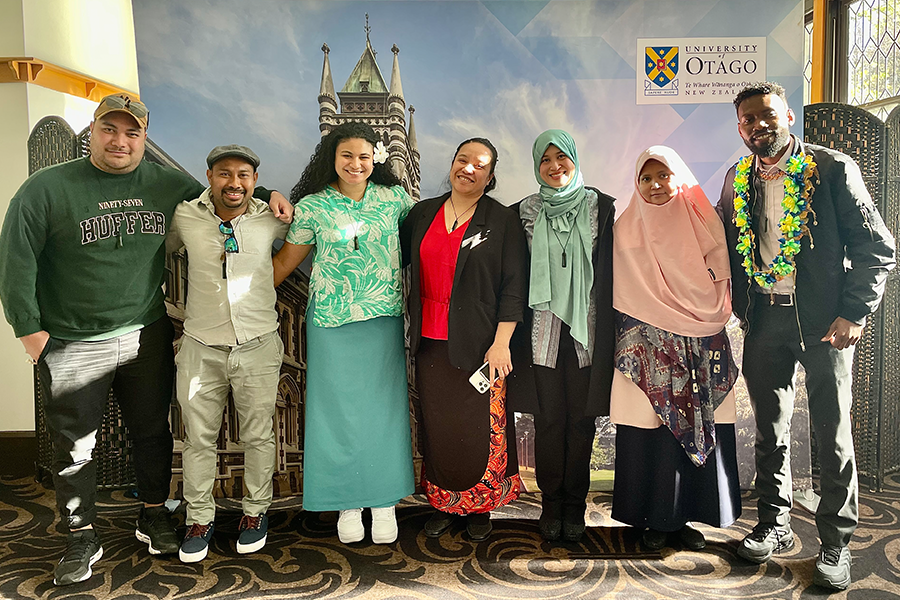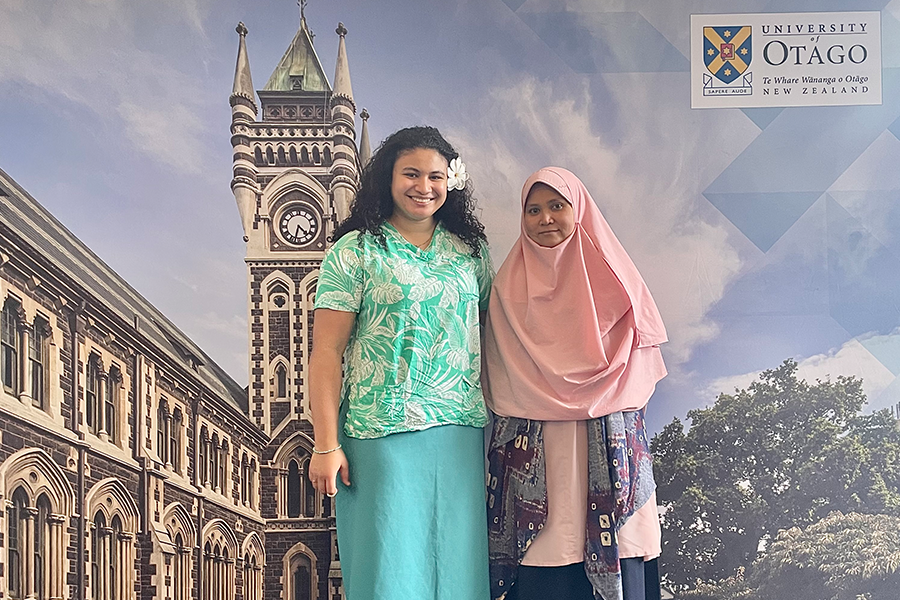
Manaaki Scholars at Friday's Completion Ceremony are, from left, Mosie Sua, Aurélio Josée Lourenҫo Da Costa Gusmāo, Ariel Ioane, Dianne Hani, Devi Asih, Ari Hayati and Michael Samani.
COVID -19, imposter syndrome, and even slang barriers were not enough to dissuade two Maanaki scholars who will soon take their newly acquired skills back to their home countries.
PhD candidate Ari Hayati and medical student Ariel Ioane joined six of their peers to celebrate their achievements as Manaaki New Zealand Scholars studying at the University of Otago at a Completion Ceremony last week.
Each semester the International Office hosts the ceremony as a way of celebrating the achievements of all the Manaaki New Zealand scholars who attended the University of Otago.
International Student Support Team Leader Simone Freeman says the ceremony is held just before the scholars complete their qualifications, as they will return to their respective home countries shortly after completing their final exam or assignments.
“The Completion Ceremony celebrates and acknowledges the completion of their qualification, the end of their stay in New Zealand and the hard work they have put in.”
PhD candidate Hayati arrived from Indonesia in 2020, while medical student Ioane arrived from Samoa in 2017 to take on Health Sciences First Year.
While studying at Otago, Hayati has been researching the effect of pulsed-electric fields during processing of fish byproduct through the Food Science Department.
Prior to her arrival, Hayati searched online for universities that were carrying out the kind of research she was interested in when she came across the University of Otago.
“When I saw my supervisor profile, I then definitely knew I will try to apply for this.”
Not long after that she came across information on the New Zealand Manaaki Scholarship.
“It seemed to me that they really support the scholar.”
Hayati, her husband and their three children arrived in Ōtepoti Dunedin in January 2020.
“We thought it would be easy to navigate our life here, but we hadn’t secured accommodation, so we ended up staying in an Airbnb.”
The sister of the Airbnb’s owner was able to provide the family with long term accommodation which was finalised one week prior to the first COVID-19 lockdown starting, she says.
Using the only source of internet available to her – on her phone – she kept in touch with the University’s International Office.
“The Manaaki Scholarship people here, they really took care of us. Every week or two they emailed me asking how I was doing during the lockdown.
“I feel very grateful, we were taken care of.”

Ariel Ioane, left, with Ari Hayati.
Ioane is about to graduate after seven years at medical school.
Applying for and receiving the Manaaki Scholarship has not only helped her professionally; it is also enabling her to give back to her home country of Samoa, she says.
She arrived a “naïve 17-year-old” just out of high school.
“It definitely wasn’t what I expected.”
Ioane had performed well academically in her hometown but says that did not prepare her for life as a student in Ōtepoti.
“It’s very different when you have the responsibility, and you’re trying to figure out how to be an adult, manage money responsibly, your time management, not having someone to push you all the time.”
It was “quite difficult” for the first few years, and not just because Health Sciences First Year is a competitive course.
When she got into medical school she realised “how little other Pacific Islanders were around” which led to her experiencing imposter syndrome; “I don’t know enough, everyone here deserves to be here, I don’t… I picked the wrong degree”.
During the fourth, fifth and sixth years of medical school, students become a part of the medical team in hospitals and it was during these placements Ioane started to gain confidence in her abilities.
Some of the hospital patients, however, presented a whole new set of challenges she had never imagined facing.
A minor one was her trouble understanding New Zealand colloquialisms.
“I’ve had patients say, ‘I feel crook’ and I did not know what that meant, or ‘being in someone’s road’. Even though it wasn’t a massive language barrier there was a slang barrier.”
She unfortunately faced a bit of sexism and racism from some patients.
“I think these have been my biggest issues all while trying to learn who I am, as an adult.”
After graduation Ioane will return to Samoa. The eldest of four, she says she has missed out on seeing her younger siblings grow up and she’s also looking forward to spending more time with her grandparents.
She was able to do her elective in Samoa this year which showed her what she would be getting into after graduation.
“New Zealand is very different from the system back home, and there are pros and cons of both.”
The Manaaki New Zealand Scholarship Programme has been offering scholarships for more than 70 years, Freeman says.
The scholarship is offered by the New Zealand Government under the New Zealand Government Development and Aid programme to provide an education or qualification to individuals from eligible countries, she says. The outcome of the study must support the developmental needs of the scholar’s home country.
Prospective students from more than 70 eligible countries can apply.
“This is a prestigious programme for the University of Otago to be part of and to facilitate. The scholarship includes full tuition fees, visa and travel costs, accommodation and living stipends, establishment and reintegration allowances, additional tutoring and other benefits,” Freeman says.
The number of scholarships available each year depends on agreements between the New Zealand Government and foreign Governments.
